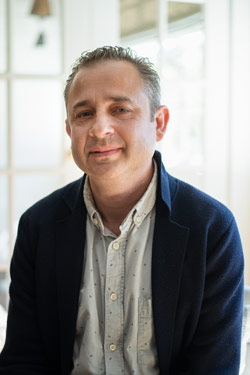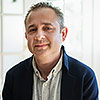By Rob Cline

Even before he had reached high school he had the good fortune of attending performances by Dizzy Gillespie, John Prine, Curtis Mayfield, Pina Bausch, the Emerson String Quartet, and many others.
It comes as no surprise that Greenwald is excited to be at Iowa, where he intends to bring world-class and forward-looking performance to the university and the broader Iowa community.
Greenwald most recently served a three year tenure as managing director of the Big Ears Festival in Knoxville, Tennessee, described by the New York Times as “one of the world’s greatest music bashes.” During his tenure, he managed the festival’s overall strategy and operations and worked to devise streaming efforts, community engagement, site-specific projects, literary events, and the festival’s tentpole programming.
Before his tenure at Big Ears, Greenwald served as executive director of Duke Performances at Duke University in Durham, North Carolina, from 2006 until 2019. During his 12-year tenure, he grew Duke Performances from a regional presenter to an organization with a national profile. With an emphasis on commissioning, producing, and presenting—and working across every conceivable genre—Duke Performances offered 100+ shows annually at more than a dozen venues both on campus and in town.
As Greenwald steps into his new role at Iowa, he shared some details about his own life in the arts and the ideas that underpin his approach to programming, collaboration, and community building.
Q: What made the University of Iowa an appealing choice?
A: The coupling of legacy with ambition that exists at Iowa. Hancher and the University of Iowa clearly have a terrific legacy in the arts over many decades. With the creation of the Office of Performing Arts and Engagement, there is an opportunity to explore new platforms for support, promotion, and creativity that leverage the full resources of the institution. It’ll be up to us, collectively, to determine how that vision unfolds. I’m thrilled to have the opportunity to participate in that venture—we’ve been encouraged to be wildly ambitious in our efforts.
I must say, arriving in Iowa City for an interview on the day that the spectacular Stanley Museum of Art reopened gave me great faith in the institution’s commitment to absolute excellence in the arts.
Q: You have said, “Geography is destiny.” What does that mean, and how does that idea inform your programming?
A: When I say “geography is destiny” in the context of my work, it’s with the belief that culture is specific and often dictated the particularities of place and region. Working through this lens is my best effort to provide a platform where we can celebrate and provide authentic context for performance and support artists that are spectacular and are also our neighbors. I don’t think, in doing this, you have to let your standards for excellence drop an inch. Arriving at Iowa, I’m interested in making a deep dive into the cultural resources and legacy of the institution and community, the state of Iowa, and the Midwest more broadly.
Q: Can you tell us about an arts experience that was deeply meaningful for you personally?
A: My childhood and young adult life were suffused with live performance—theater, dance, every type of music, writers in conversation. I grew up in the San Francisco Bay area and my mother had a bowl on the dining room table filled with tickets for performances we were meant to see. Some that I remember distinctly: Bobby McFerrin performing for an intimate audience in front of a Jackson Pollock at the San Francisco Museum of Modern Art; Dizzy Gillespie leading an Afro-Cuban band at a jazz club in the East Bay; sitting directly behind Alvin Ailey as his company performed Revelations at UC Berkeley; a sublime double-bill of John Prine and Arlo Guthrie; and the great mime Marcel Marceau performing on one of his last tours of the states, as well as many, many visits to the San Francisco Symphony at Davies Hall. I saw all of these performances and many more before I had gotten to high school.
Put simply, I’ve been conditioned from an early age to understand the world through art and performance.
Q: What role do you hope the performing arts play in the lives of University of Iowa students?
A: I want it to be central to their experience in Iowa City. And I hope that they learn to recognize the arts as a place of refuge and provocation where they can better understand themselves and the world around them.


